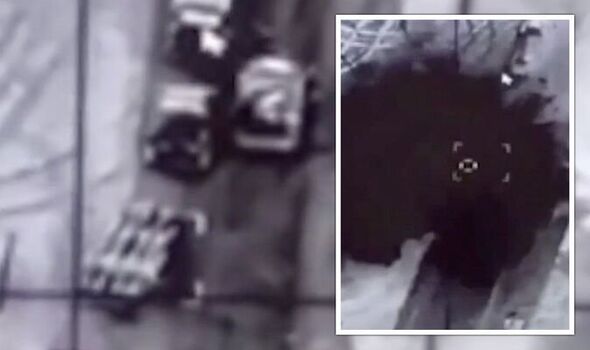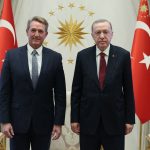If Russia succeeds in toppling the government of Ukrainian President Volodymyr Zelensky, it would be a major setback to Turkish drone programs, as well as other military aerospace projects.
Ankara and Kyiv had grand plans to expand cooperation to build drones together.
Turkey sold Ukraine at least 20 Bayraktar TB2 armed drones in recent years, which Ukraine seems to be using effectively against Russian forces in the current war. In 2021, Ukraine announced that it was building a drone factory for co-producing TB2s with Turkey. Ukraine is also supplying Turkey with the engines for successor models to the TB2 and an attack helicopter under development, and there have been reports that their defense cooperation could go deeper.

Then came Russia’s Feb. 24 invasion of Ukraine.
The end of Turkey-Ukraine military-technical cooperation?
“Russia is seeking to replace the Zelensky government that Turkey has been doing all the arms business with and replace it with a Russian client regime,” Nicholas Heras, Deputy Director of Human Security Unit at Newlines Institute for Strategy and Policy, told me.
“It is likely that U.S. and European sanctions would make it difficult for Turkey to do business with a post-war, Russian-backed regime in Ukraine, full stop.”
Aaron Stein, director of research at the Foreign Policy Research Institute, assumes that if Zelensky is topped “the pro-Russian leadership is not going to be as cordial to Ankara — a NATO member — and that there will be less enthusiasm to sell equipment to Turkey.”
Stein noted that Ankara had turned to Ukraine for the initial engines for its new Bayraktar Akinci drone, the famous TB2’s successor, and the T929 heavy attack helicopter it is developing.
“Turkey is going to have to find alternative suppliers,” he told me. “Beyond this, there were reports that Turkey could work with Ukrainian turbofan producers for engines for the TF-X and MIUS projects.
The TAI TF-X is Turkey’s fifth-generation stealth fighter project and the Bayraktar MIUS, which stands for Combat Unmanned Aircraft System, is a planned jet-powered drone.
“Again, we do not know, but my baseline assumption is that these two nascent efforts will also go up in smoke,” Stein said. “Turkey could turn elsewhere, perhaps to Rolls Royce or U.S. firms, but that is a choice folks in Ankara have to make.”
James Rogers, Assistant Professor in War Studies at SDU in Denmark, predicts that any Russian destruction or takeover of the Ukrainian defense industry will impact Turkey’s drone production in “two core ways.”
“Firstly, it will slow the production of the Turkish Akinci drones (which are powered by Ukrainian-built Ivchenko-Progress AI-450 turboprop engines),” he told me. “Secondly, it will slow the development of the advanced Turkish Bayraktar MIUS (which were set to be powered by the Ukrainian Ivchenko-Progress AI-322F Turbofan engine).”

“This will likely degrade Turkey’s planned drone exports and slow the bolstering of its own arsenal.”
Rogers also pointed out that the future of the TF-X program is generally uncertain and involves “lots of moving parts, with the U.S., Russia and Ukraine all said to be involved in aspects of production.”
“As a result, there can be little doubt that the current conflict in Ukraine will complicate the progress of the project,” he said.
Samuel Bendett, a research analyst with the Center for Naval Analyses, where he is a member of the Russia Studies Program, also predicts that any future Turkey-Ukrainian military-technical cooperation “will be determined by the outcome of this conflict and the state of Ukraine’s government independent decision-making with respect to its international partners after the conclusion of combat.”
If Russia achieves its objectives and successfully forces Ukraine to adhere to its foreign policy demands, “then military cooperation with Turkey would be off the table as one of the conditions for a more pro-Russian Ukraine.”
“If, on the other hand, Ukraine retains the ability to make its own choices after the conclusion of this war, it would be able to retain its ties to Turkey,” Bendett told me. “Still, Russia may try to force the prohibition of the development and acquisition of long-range combat drones by Ukraine as a price for peace, similar to the possible restriction on the development and use of long-range missiles by Ukraine, assuming Russia achieves its military gains and the current Ukrainian government is still in power.”
However, if Russia successfully forces Zelensky from power and replaces him with a pro-Russian leader, “then the entire Ukrainian military program may be reviewed and new priorities set.”
“It is my understanding that Turkey wanted engines for Akinci, and so if the above-mentioned conditions are in force, it may need to develop such engines domestically or try to find them elsewhere,” Bendett said.

“In the end, the loss of Ukraine as a military-technical partner would not have that much of an effect on Turkey assuming alternative technology acquisition routes are found.”
Can TB2 be a game-changer for Ukraine?
2020 was a landmark year for Turkey’s Bayraktar TB2 drone. Its headlining grabbing operational use over the battlefields of Syria, Libya, and the Nagorno-Karabakh attracted dozens of export customers from Africa, Central Asia, and Europe.
Ukraine had at least 20 TB2s at the start of this war after first ordering the drone in 2019.
“On the battlefield, a close dynamic to watch is how extensively Ukraine deploys TB2s against Russian forces, and if so, how effective the drones are against conventional Russian forces,” Heras said. “Ukraine will be the toughest test for Turkey’s most hyped defense export.”
However, Baker and Bendett doubt the Ukrainian TB2s can play a similar game-changing role in this current conflict to the one played by Azerbaijan’s TB2s in the 2020 Nagorno-Karabakh war.
“The Ukraine Crisis is not the same as the conflict in Nagorno-Karabakh,” Rogers said. “Russia has far more experience of air defense (from its fight against ISIS drones in Syria) and has the ability to degrade the command and control of hostile drones.”
It is, therefore, unsurprising that drones have “not had the same level of success they did in the Caucasus.”
“It is a commonly held truth that when faced with an advanced state military, even the most hi-tech level of current drone technology – not just TB2s – would find it hard to operate effectively,” Rogers said.
Bendett also pointed out that the Russian military had previously insisted that the TB2 does not pose much of a threat to its forces given their “advanced early warning, electronic warfare and air defense technologies – the tech that was largely absent on such a scale in the 2020 Nagorno-Karabakh war.”

If most or even all of Ukraine’s TB2s are ultimately destroyed in this war, that won’t likely affect Turkey’s ability to market and export them.
“I don’t think TB2 sales prospects would be affected if they are lost in Ukraine – after all, TB2s were also lost in Libya, Syria, and Nagorno-Karabakh to older Soviet-made air defense systems,” Bendett said. “The TB2 is seen by many countries as a good bargain, and until a good competitor enters the market, it may enjoy strong sales.”
He concluded by pointing out that Russia’s defense industry is marketing its Orion drone as a competitor to the TB2, boasting that it can fly faster and higher than its Turkish rival.
By : Paul Iddon
Source: Forbes



